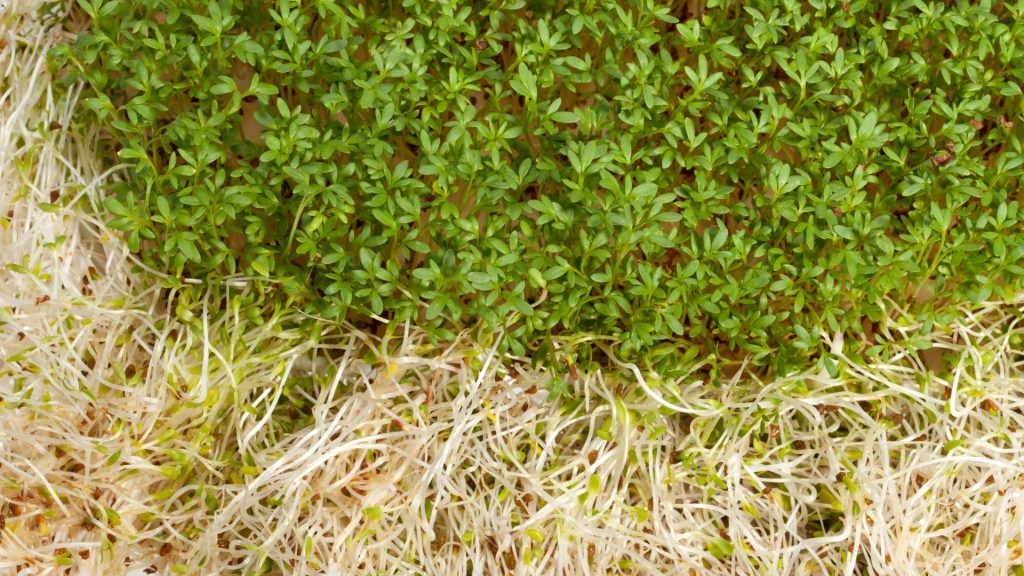Alfalfa (Medicago L.) is a plant that is widespread in our country and belongs to the legume family. Currently, there are more than one hundred varieties in the world that differ in appearance, soil requirements, and nutritional properties. Oan came to our continent from Asia, where it is considered one of the most valuable. The history of its use dates back to antiquity. Its name comes from an Arabic word that literally means the father of all food.
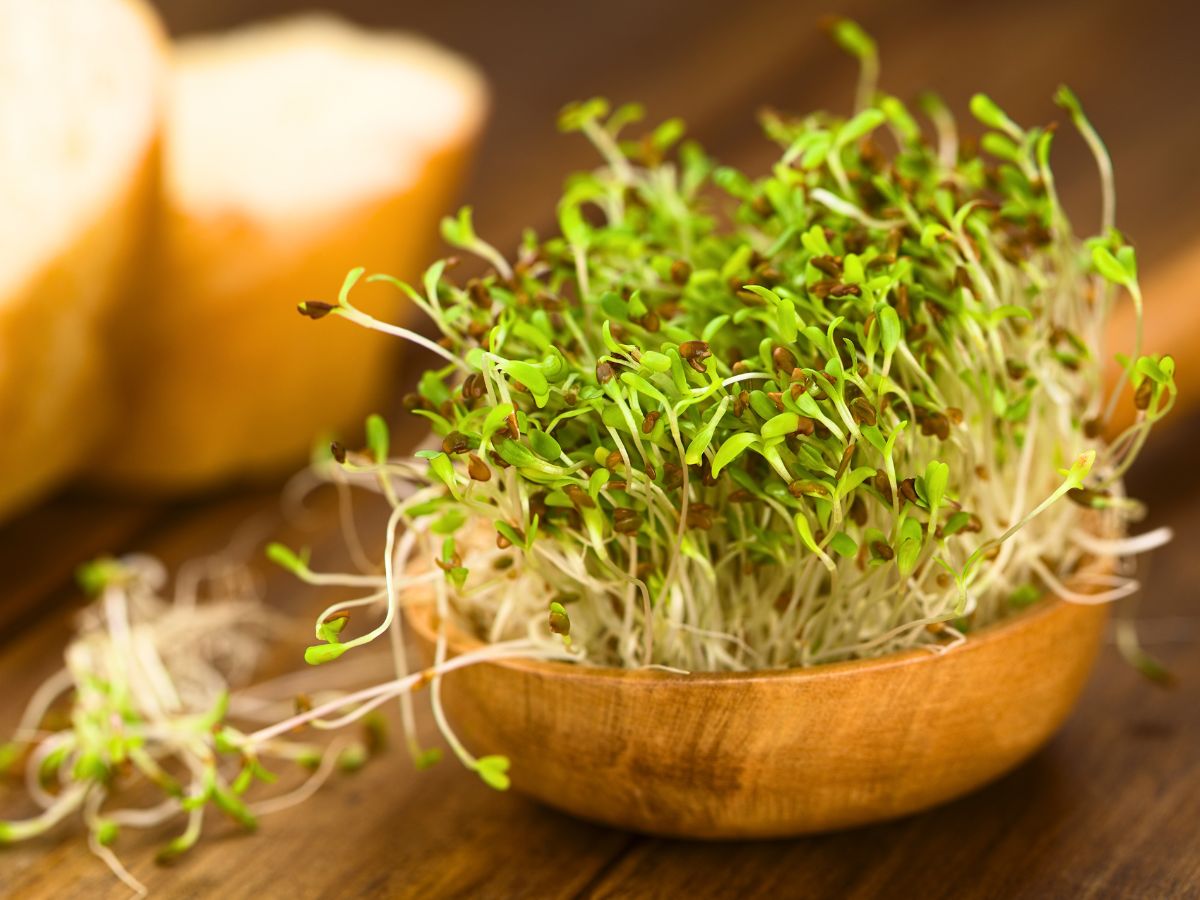
Yellow alfalfa sprouts is a perennial with a powerful root system. The stems of the plant are numerous, ascending.
Hop-like sprouting alfalfa is an annual and biennial herb that has a taproot that can penetrate the ground to a depth of 40 centimeters.
| Medicágo | Medicágo |
| Common Name | Alfalfa |
| Plant Type | Fabaceae |
| Size | 1,5—8 cm |
| Bloom Time | 1.5-2 months after sowing and can last up to 3-4 weeks |
| Flower Color | all shades of blue, purple, yellow, can be variegated or white |
| Hardiness Zones | frost resistant |
| Native Area | Mediterranean region |
| Toxicity | not toxic |
How to Grow Alfalfa Sprouts at Home?
You can also grow alfalfa sprouts in a wild plant in the garden. So, how to make alfalfa sprouts? Before you start sowing grass, you need to carry out preparatory work:
- Free the area from weeds.
- Loosen the ground.
- Apply fertilizer to the soil.
- Sow seeds in separate rows or together with legumes or cereals.
The herb is commonly grown as pet food. For medicinal and gastronomic purposes, the grass can be grown without soil. To do this, simply sprout sprouts. They taste like green peas.

Learning how to grow alfalfa sprouts at home is not that difficult. The simplest how to grow alfalfa sprouts seed germination equipment is a seed tin can with a germination lid. Germination covers are available where you buy seeds or at the canning section of your grocery store. You can make sprouting alfalfa in a jar yourself by covering it with a double layer of gauze and securing it in place with a large rubber band. Clean equipment with a solution of 3 tablespoons of odorless bleach per liter of water and rinse thoroughly.
Buy certified, pathogen-free, packaged, and labeled seeds for germination. Alfalfa sprouting seeds prepared for planting can be treated with insecticides, fungicides, and other chemicals and should not be eaten. If you want to take extra precautions and know how to grow alfalfa sprouts in trays, you can disinfect the seeds in a pot of hydrogen peroxide heated to 140 degrees (60 C). Dip the seeds in heated hydrogen peroxide and stir frequently, then rinse for 1 minute under running tap water. Place the seeds in a container of water and remove any floating debris. Most of the pollution comes from this debris.
How to Sprout Alfalfa?
For alfalfa germination seeds you need:
- Soak a bag of seeds in a cup of cold water overnight.
- In the morning, rinse the seeds thoroughly and transfer to another container.
- Give the container a horizontal position.
- Rinse the seeds at least 3 times a day.
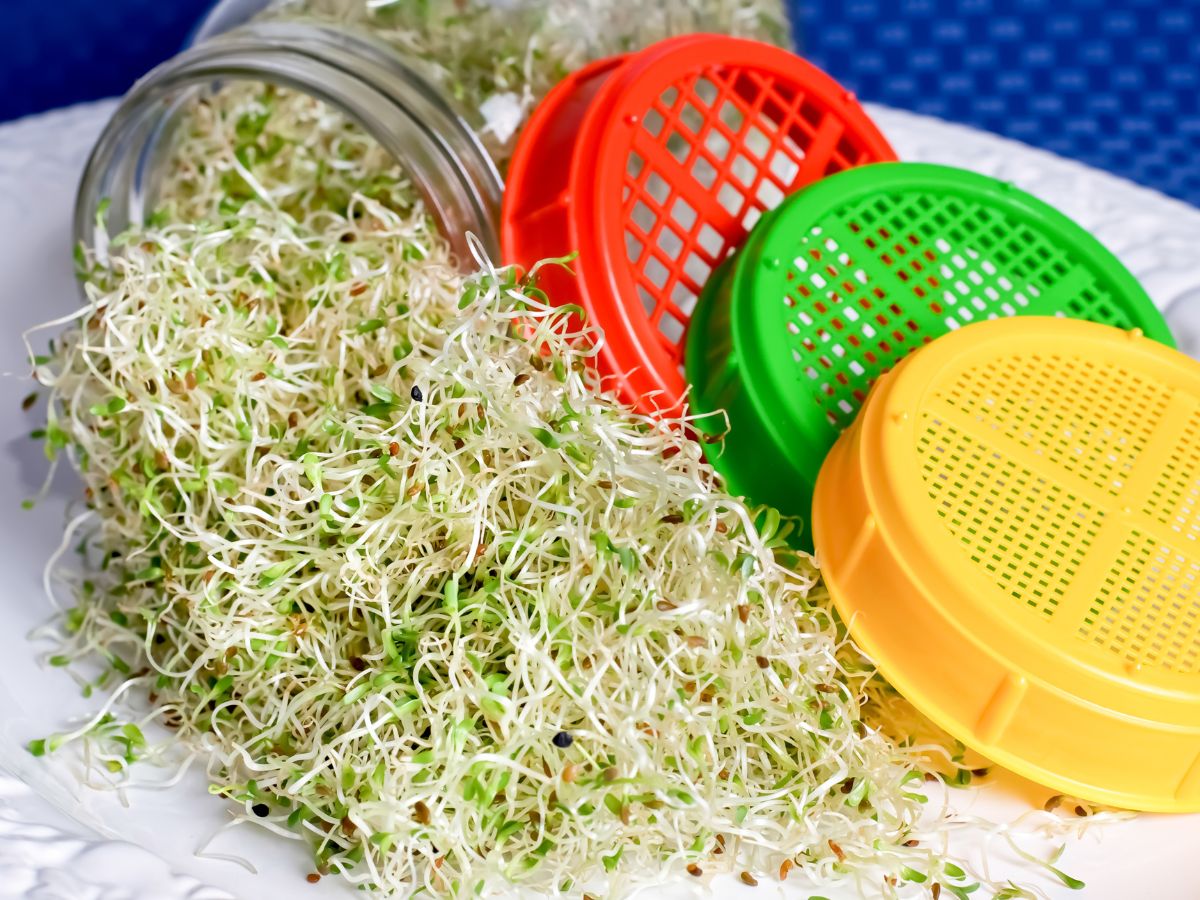
Seedlings will appear in 7 days. Before use, it is necessary to separate the change from the sprouts. Rinse the sprouts and store them in a paper towel on the top shelf of the refrigerator. The photo clearly shows how the sprouts should look like.
The ground part of the plant is harvested during the flowering period. Leafless lower parts should not get into the raw material. Dry the grass in a ventilated and warm room. You can dry outdoors, but always in the shade.
How to Grow Alfalfa Sprouts Indoors?
The easiest way how to sprout alfalfa seeds in a mason jar:
- Cover the seeds with warm water for four to eight hours. How to plant alfalfa sprouts? Cover the container with gauze and put it in a warm place, wrapped in a dark cloth. Then fill the tray with soil 4-5 cm, there should besides that will hold the seedlings.
- Spread the seeds over the soil surface, tamp lightly. The seeds should not stick together, they need a little space. Large seeds should cover the entire surface. Sprinkle seeds from a spray bottle.
- Cover the container and place it in a dark, warm place for a couple of days (up to five). Ventilate the room daily and check the seedlings, irrigate if necessary.
- After three to five days, the stems appear – now they are ready to settle on the windowsill. The lighter the better. It is necessary to irrigate with a sprayer. You can cut it off as soon as a couple of real leaves appear.
- The soil can be sorted out and used again. You don’t need to fertilize – everything you need is in the seed.
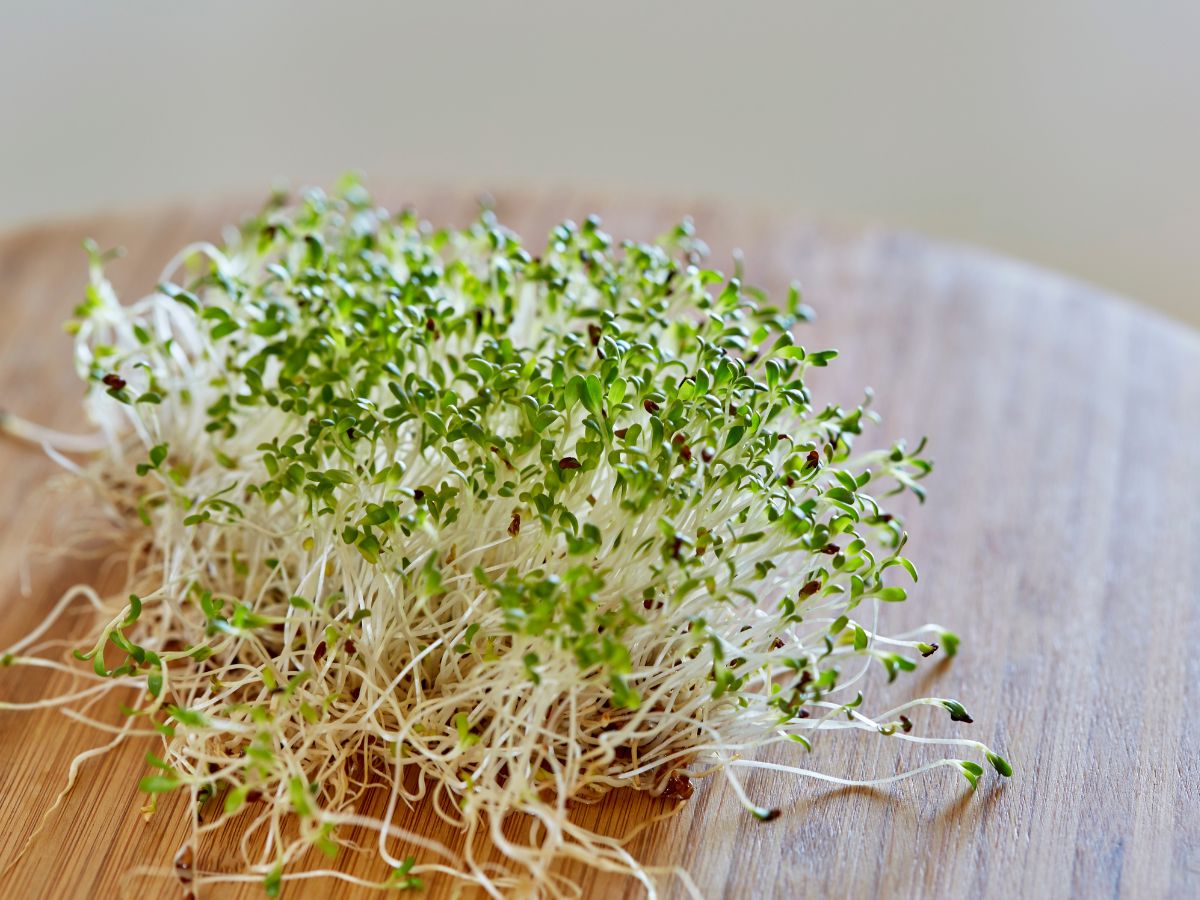
Plant spread
Alfalfa grows everywhere, but black soil is the optimal soil for it. The predecessors of alfalfa sprouts growing on the site can be potatoes, corn, melons.
An alfalfa sprout growing kit of a plant can be obtained only with deep plowing of the soil. The harvest increases the introduction of molybdenum into the soil.
Alfalfa – Nutritional Value
Alfalfa is used for food – its leaves, shoots, and grain.
You already know how to grow alpha sprouts, it is also low energy food (23 kcal / 100 g). They also contain 3.99% vegetable protein, 2.1% bioavailable carbohydrates, and 1.9% fiber. In addition, they are also a source of potassium (79 mg / 100 g), phosphorus (70 mg / 100 g), calcium (32 mg / 100 g) and magnesium (27 mg / 100 g). They also contain acids from the omega-6 family (234 mg / 100 g) as well as omega-3 (175 mg / 100 g). They are a delicious addition to breakfast and salads.
Alfalfa Sprouts Season – Beneficial Properties
Alfalfa is used throughout the world as a food ingredient in raw food and vegetarian dishes. Modern scientific research clearly confirms that alfalfa leaves and stems are high in vegetable protein, vitamins, and minerals.
In their composition, you can list the found B vitamins: B1, B6, B12, vitamins C, D, E, and K, as well as a large amount of beta-carotene. The minerals contained in alfalfa, iron, potassium, manganese, phosphorus, and calcium deserve special attention. In addition, alfalfa leaves have a high concentration of phytoactive substances such as alpha-carotene, chlorophyll, coumarin, cryptoxanthin, daidzein, fumaric acid, lemon, lutein, saponins, stigmasterol, and many others. The substances contained in alfalfa promote the absorption and absorption of protein, carbohydrates, calcium, and iron from the lumen of the digestive system.
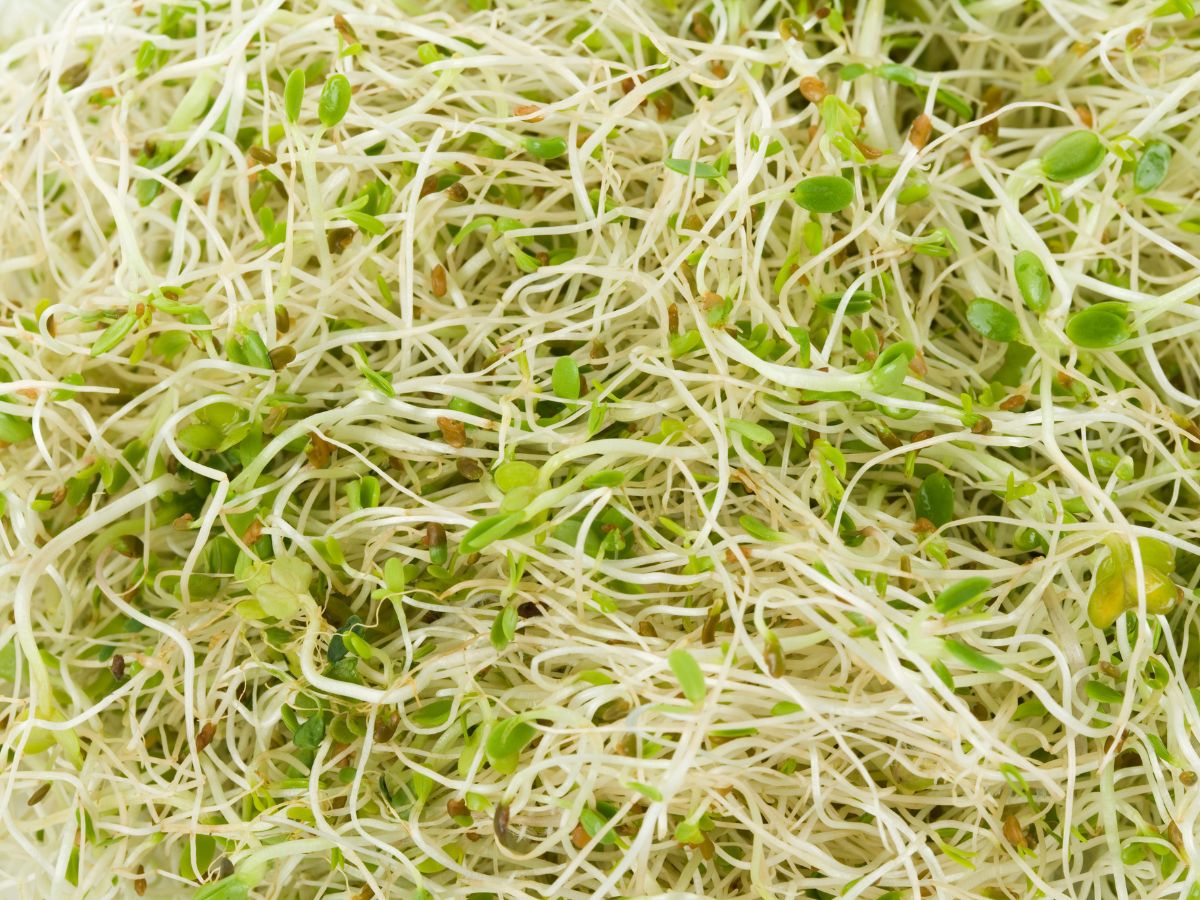
Particular attention should be paid to the chlorophyll found in alfalfa. It is a phytochemical, natural plant dye that prevents the formation of cancerous lesions and supports their treatment. Alfalfa is mainly used to treat cancers located in the digestive system, such as anal cancer, colorectal cancer, or colon cancer.
The plant has also been credited with other health functions, including:
- improving the sexual function of both women and men,
- support for the treatment of diseases of the bladder and kidneys,
- relief of rheumatic pains,
- promoting the lactation process,
- improvement of hemoglobin in blood serum,
- improving overall well-being.
Alfalfa is called the queen of forage crops in most countries. This is true, because the plant, with proper care and irrigation, gives at least 35 tons of hay per hectare during the growing season.
Frequently Asked Questions (FAQs)
What are alfalfa sprouts?
Alfalfa sprouts are young shoots of the alfalfa plant (Medicago sativa) that are typically consumed as a fresh and crunchy addition to salads, sandwiches, and other dishes. They are known for their mild and slightly nutty flavor.
Are alfalfa sprouts safe to eat?
While alfalfa sprouts are generally considered safe to eat, there have been some cases of foodborne illness associated with contaminated sprouts. This is because the warm and moist conditions required for sprouting can also promote the growth of harmful bacteria, such as Salmonella and E. coli. To reduce the risk of foodborne illness, it’s important to handle and store alfalfa sprouts properly, including washing them thoroughly before consumption.
Can anyone eat alfalfa sprouts?
Most people can safely eat alfalfa sprouts as part of a healthy diet. However, certain individuals, such as pregnant women, young children, elderly individuals, and those with weakened immune systems, may be at a higher risk of foodborne illness and should exercise caution when consuming raw sprouts. It’s always best to consult with a healthcare professional if you have any concerns.
How should alfalfa sprouts be stored?
Alfalfa sprouts should be stored in the refrigerator in a clean and covered container to help maintain their freshness and prevent contamination. They are best consumed within a few days of sprouting for optimal taste and nutrition.
How can I use alfalfa sprouts in recipes?
Alfalfa sprouts can be used in a variety of recipes. They can be added to salads, sandwiches, wraps, soups, stir-fries, and other dishes for a crunchy texture and a fresh, mild flavor. They can also be used as a garnish or topping for various dishes to add a nutritious and visually appealing element.
Can I grow alfalfa sprouts at home?
Yes, alfalfa sprouts are easy to grow at home using alfalfa seeds and basic sprouting equipment, such as a sprouting tray or a jar with a mesh lid. There are many online resources available that provide detailed instructions on how to grow alfalfa sprouts at home.
Are there any culinary tips for using alfalfa sprouts?
Yes, here are a few culinary tips for using alfalfa sprouts:
- Wash thoroughly: Always wash alfalfa sprouts thoroughly with clean water before consuming to remove any dirt, debris, or potential contaminants.
- Add last minute: Add alfalfa sprouts to your dishes at the last minute to preserve their crunchiness and freshness.
- Combine with other ingredients: Alfalfa sprouts can be combined with other ingredients, such as other types of sprouts, vegetables, or proteins, to create a balanced and flavorful dish.
- Experiment with different cuisines: Alfalfa sprouts can be used in a wide range of cuisines, from Asian stir-fries to Mediterranean wraps to Mexican tacos. Don’t be afraid to experiment with different flavor combinations and culinary styles to make the most of their mild and versatile taste.
- Store properly: Store alfalfa sprouts in the refrigerator and use them within a few days to maintain their freshness. Avoid storing them in a wet or damp environment, as excess moisture can promote spoilage and bacterial growth.
- Be mindful of food safety: As with any raw produce, it’s important to practice good food safety habits when handling and consuming alfalfa sprouts. Wash your hands thoroughly before handling sprouts, use clean utensils and equipment, and store them in a clean and covered container in the refrigerator.
- Consider cooking: If you’re concerned about food safety or prefer a softer texture, you can also consider lightly cooking alfalfa sprouts by stir-frying, sautéing, or blanching them before adding them to your dishes. This can help reduce the risk of foodborne illness while still enjoying their unique flavor and nutritional benefits.
Can I freeze alfalfa sprouts?
Alfalfa sprouts are typically consumed fresh and are not recommended for freezing, as freezing can affect their texture and flavor. It’s best to consume alfalfa sprouts when they are fresh for the best taste and nutritional value.
Can I eat alfalfa sprouts if I have allergies or dietary restrictions?
If you have allergies or dietary restrictions, it’s important to be cautious when consuming alfalfa sprouts. Some people may be allergic to alfalfa, and if you have a known allergy to legumes or related plants, you should avoid alfalfa sprouts. Additionally, if you have specific dietary restrictions or concerns, such as being on a low-sodium or low-oxalate diet, it’s best to consult with a healthcare professional or a registered dietitian to determine if alfalfa sprouts are suitable for your individual needs.
Where can I buy alfalfa sprouts?
Alfalfa sprouts are widely available in most grocery stores, health food stores, and farmers’ markets. You can typically find them in the produce section, either loose or packaged in plastic containers. When purchasing alfalfa sprouts, look for fresh and crisp sprouts with no signs of wilting or spoilage.


